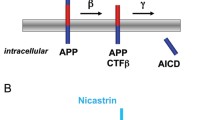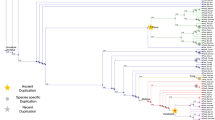Abstract
Mutations in the human presenilin genes cause the most frequent and aggressive forms of Alzheimer’s Disease. They results in an increase of the 42 amino acid variant of amyloid β peptide that rapidly aggregates into neurotoxic plaques. In addition, lack of presenilin activity prevents the proteolytic cleavage of the Notch receptor of intercellular signaling. The biological role of presenilins is evolutionary conserved in animals. This review summarizes recent results obtained from animal models to understand presenilin activity and malfunction.
Similar content being viewed by others
Author information
Authors and Affiliations
Rights and permissions
About this article
Cite this article
Baumeister, R. The physiological role of presenilins in cellular differentiation: lessons from model organisms. European Archives of Psychiatry and Clinical Neurosciences 249, 280–287 (1999). https://doi.org/10.1007/s004060050100
Issue Date:
DOI: https://doi.org/10.1007/s004060050100




